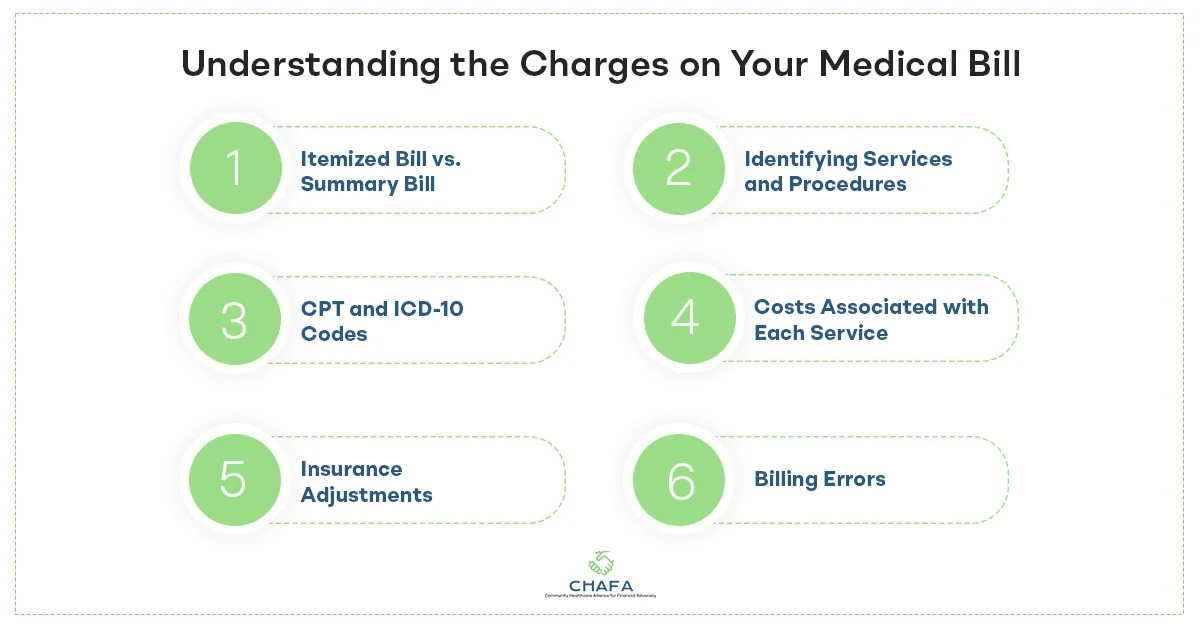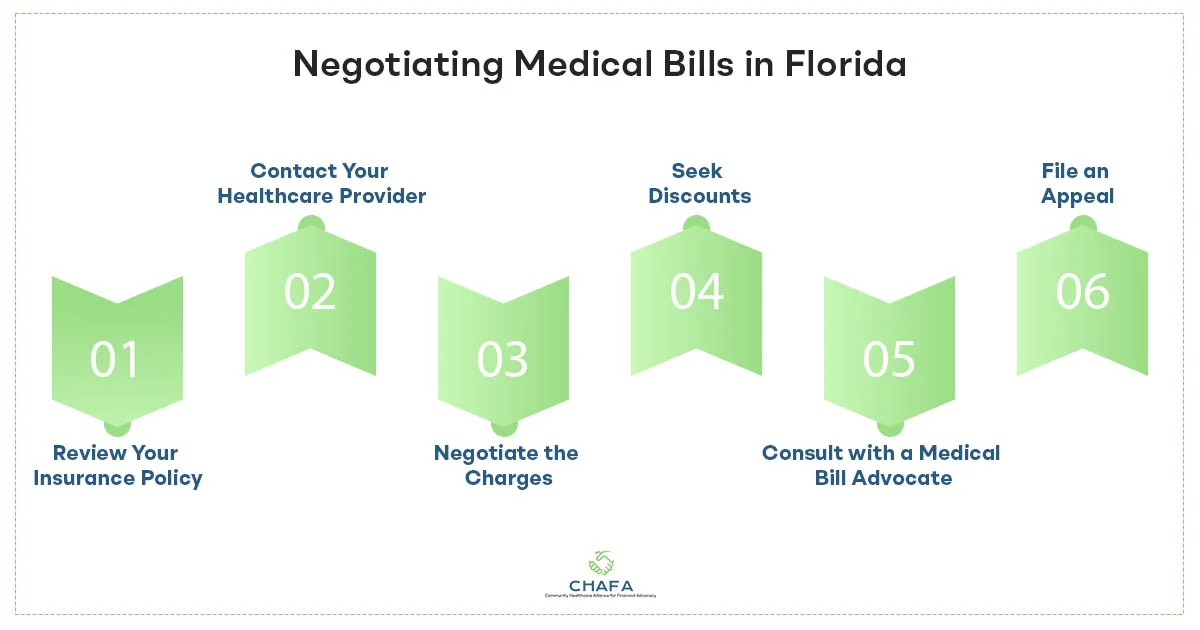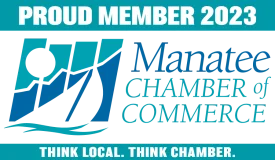
Medical bills in Florida can be a big financial strain as healthcare expenditures tend to be exorbitant. There are, however, ways to reduce these costs and gain control of your medical bills.
In this comprehensive guide, we’ll explore the art of negotiating medical bills in Florida. By learning effective ways to negotiate medical bills, you can potentially save thousands of dollars with the right data and resources.
This is where medical bill advocacy services can be a huge help.
Understanding the Charges on Your Medical Bill
Before delving into the intricacies of how to negotiate medical bills, it’s important to understand the charges that make up your medical bill. Medical bills can be complicated, and filled with overwhelming medical jargon. Familiarizing yourself with the components of a medical bill will empower you to take control of your healthcare costs.

1) Itemized Bill vs. Summary Bill
When you receive a medical bill, one of the first things you should look for is whether it is itemized or a summary charge.
An itemized bill breaks down each service, procedure, medicine, or test you received in depth. A summary bill, on the other hand, just shows a single charge total.
Receiving an itemized bill is always preferable as it makes it easy to spot any discrepancies or irregularities in the charges.
2) Identifying Services and Procedures
An itemized bill will detail all of the treatments and procedures provided to you during your medical visit.
These could include doctor’s appointments, lab tests, surgeries, prescriptions, and other medical treatments.
Each service or procedure has its own code and description, making it easy to comprehend what you’re being charged for.
3) CPT and ICD-10 Codes
Medical services and diagnoses are identified and categorized based on Current Procedural Terminology (CPT) codes and the International Classification of Diseases, 10th Edition (ICD-10) codes.
Understanding these codes helps you understand your medical bill better. The CPT code indicates the service or procedure, whereas the ICD-10 number defines the diagnosis or rationale for the treatment.
4) Costs Associated with Each Service
The cost for each medical service and operation is listed next to it. This is the fee charged by the healthcare provider for that specific service.
It is important to check these costs to ensure they are correct and acceptable.
Overinflated prices on a medical bill are not unusual, and this is where negotiations and medical bill advocacy services offered by CHAFA can help.
5) Insurance Adjustments
If you have health insurance, you might notice insurance modifications on your medical bill. These adjustments indicate the difference between the original costs of the healthcare provider and the negotiated prices agreed upon by your insurance company. Understanding these changes can help you see the exact cost you must pay.
6) Billing Errors
Medical bills can be riddled with errors, including duplicate charges, services you didn’t receive, or incorrect coding. It’s essential to scrutinize your bill for any discrepancies and bring them to the attention of your healthcare provider or insurer.
Negotiating Medical Bills in Florida

1) Review Your Insurance Policy
Begin by thoroughly researching your health insurance policy and understanding your coverage. Make a note of your deductible, copayments, coinsurance, and maximum out-of-pocket. Knowing your insurance policy inside and out will provide you with negotiating power.
2) Contact Your Healthcare Provider
If you see any anomalies or inaccuracies on your medical bill, reach out to your healthcare provider’s billing department as soon as possible. Explain the problem and provide evidence, such as insurance policy information, to back up your claim.
3) Negotiate the Charges
If you believe the costs on your bill are excessive, don’t be hesitant to negotiate with your healthcare provider. Keep in mind that many healthcare professionals are willing to negotiate, especially if you are in financial difficulty. Prepare to explain your circumstances and give documents to back up your request for a lower rate. A medical bills attorney can be of great help during this period.
4) Seek Discounts
Inquire with your healthcare provider if they offer any discounts for immediate payment or for self-funded patients. Some suppliers offer lower rates if you pay a portion of your account in advance. Also, find out about any financial help programs or charitable care choices that the provider may supply.
5) Consult with a Medical Bill Advocate
Consider hiring a professional medical bills attorney to assist you. These professionals are competent at negotiating medical bills on your behalf, ensuring that you are charged fairly and accurately. They frequently detect billing problems and anomalies that you may have overlooked.
6) File an Appeal
If your insurance company denies coverage for a specific service or procedure, don’t be afraid to file an appeal. Insurance companies can make errors too, and an appeal might result in coverage being approved.
Utilize Florida Medical Bill Assistance Programs
In Florida, there are various medical bill assistance programs designed to help individuals facing financial difficulties.
These programs can provide support in negotiating medical bills, securing financial aid, or finding alternative payment arrangements.
Some well-known programs in Florida include
- Florida Hospital Care Program: This program offers financial assistance to eligible patients who are uninsured or underinsured. It helps cover the cost of hospital services for those in need.
- Medicaid: If you meet the income and eligibility requirements, Medicaid can provide financial assistance for medical bills, ensuring that you receive the healthcare you need without overwhelming expenses.
- Local Non-Profit Organizations: Many non-profit organizations in Florida provide financial assistance and resources to help individuals negotiate their medical bills and access affordable healthcare.
Medical Bill Advocacy Services in Florida
To further assist individuals in mastering the art of negotiating medical bills, Florida offers various advocacy services. Organizations such as CHAFA specialize in helping patients navigate the complex world of medical billing and insurance, ensuring that their financial interests are protected. A team of experts can review your medical bills, identify errors, and negotiate on your behalf.
Negotiating medical bills can be a time-consuming process. Be patient and persistent. Continue following up with your healthcare provider, insurer, or any assistance programs until you reach a resolution. For more information on medical bills and coding services offered by CHAFA, reach out via email info@chafahelps.com or call +1-941-713-9147.

